Nikolas P. Robinson's Blog, page 49
January 31, 2021
The Only Good Indians by Stephen Graham Jones
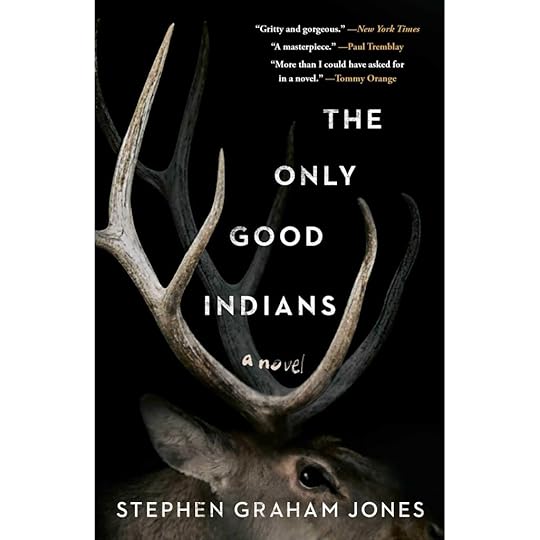
Stephen Graham Jones tells a fascinating and original story of four friends who made a horrible mistake and how the choices years before come back to haunt the men one-by-one. He weaves together life on and off of the Blackfeet reservation for these men who’s lives never quite turned out the way they expected, painted expertly on a tapestry of indigenous spirituality and culture, as well as the way nature and the supernatural can intermingle in the most interesting and horrifying ways.
The way Jones manages to make even the most mundane things somehow beautiful and captivating is perhaps the most amazing thing about him as a writer. His storytelling and descriptive elements are unrivaled by most.
What we end up with, in The Only Good Indians, at the core is an unconventional tale of revenge and motherhood that I couldn’t put down if I’d wanted to.
The Living Dead by George A. Romero and Daniel Kraus
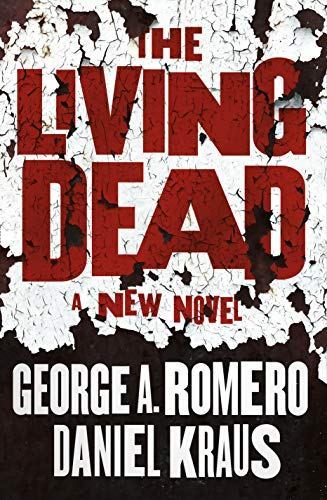
It’s a testament to the skill of Daniel Kraus as an author that I couldn’t pick apart which elements of this were remnants of the unfinished material from George A. Romero and which aspects were things Kraus brought to the table.
There is a lot of book here, spanning from the very beginning of the zombie apocalypse fans of Night of the Living Dead are quite familiar with all the way to the interval when society begins to rebuild a hopefully better civilization from the ashes and decay left behind after a decade and a half of zombies and struggling to survive.
The story is told by focusing on a handful of specific characters and showcasing their efforts to navigate the nightmare their world has become, during different periods of the apocalypse and the aftermath. It shouldn’t need to be said, but not everyone survives to the end…or at least they don’t survive in the way you might hope.
Filled with the scathing, and not always subtle social commentary you should expect from Romero…this book tells us more about ourselves and the world we’re currently living in than it does about the ghouls and how they came about.
It was additionally a nice touch that there were chapters dedicated to showcasing the internal landscape of the zombies, making them out to be more than simply the mindless killing machines we often consider them to be when we’re watching the movies. Of course, fans of Day of the Dead and Land of the Dead should know that Romero very clearly had it in mind that there was still something going on behind those dead, white eyes.
January 30, 2021
A Foreign Evil by Carver Pike
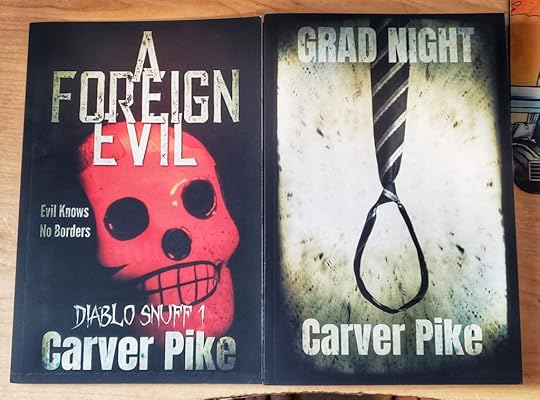
A Foreign Evil is the perfect novella for those who enjoyed movies like Hostel and Turistas, but felt like it was missing some much-needed smut and just a smidge of the sheer brutality of Survivor by J.F. Gonzalez.
This is definitely a book written for those of us who are sick enough to actively peer into the darkness while unspeakable horrors take place in the shadows…willing the light to shine just a little bit brighter and knowing we might regret it if we get our wish.
I have no doubt that I will be wanting to read the rest of the books that are connected to the organization introduced here, Diablo Snuff…because, like many of you, I just can’t help myself.
Touch the Night by Max Booth III
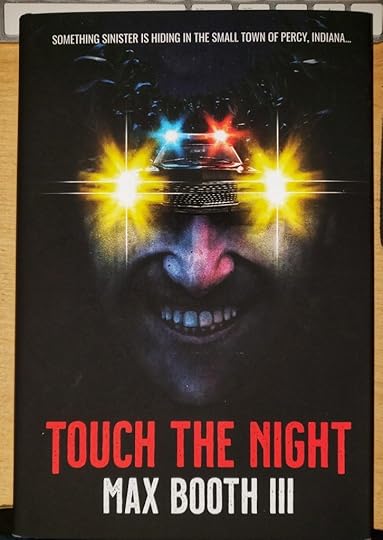
I’m lucky enough to have preordered one of the signed/numbered hardcover editions from Cemetery Dance. Number 98 is mine. It took me a couple of months to even begin reading this book because I felt almost bad about opening it and putting any sort of wear on it because it just looked so damn nice, untouched as it was.
I wish I’d started reading it sooner.
Sometimes an author releases a work that is as timely as it is timeless, purely out of luck and random chance. Chuck Wendig’s Wanderers being released just before a pandemic took hold of the world’s attention comes to mind. Max Booth III’s Touch the Night being published in the midst of protests and riots ignited by police brutality and systemic racism hits the mark.
This is a book that goes beyond the otherworldly, surrealist horror at its core and paints an all too realistic (and no less horrifying) canvas of race relations, police corruption (and incompetence), and human shortcomings to enhance the terror lurking beneath the surface. The characters are relatable and real in such a way as to make the events of this novel all the more awful. Having been a bit of a juvenile delinquent in my own youth, I could absolutely relate to boys sneaking out at night and being up to no good. Being a parent, I was also unpleasantly faced with putting myself in the shoes of someone finding out that their child is not only missing, but likely kidnapped.
It’s not all bad though, as there is something to be said for characters finding strength they never knew they had when faced with impossible, hallucinatory situations…even as everything spirals further out of control and you can do nothing but helplessly watch it happen.
As a whole, this is a brutal, visceral story that I can’t recommend enough. I’ve recommended all of the author’s books that I’ve read, and this one is no different. This is a must-read for anyone who enjoys horror.
Besides, how many books give you the chance to listen to two characters wistfully discussing their missing penises before requesting robotic replacements only a short while later?
Zoey Punches the Future In the Dick by David Wong
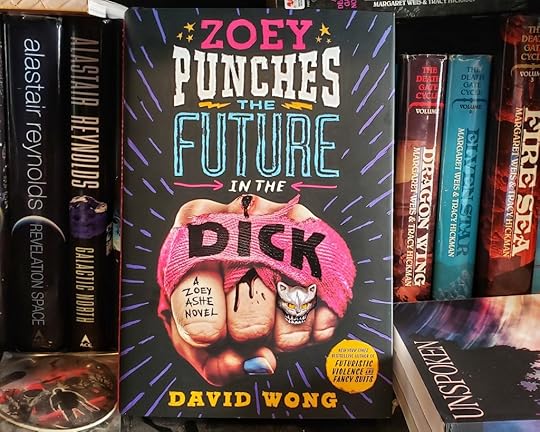
With Zoey Punches the Future In the Dick, David Wong (Jason Pargin) successfully pulled off a difficult task in writing a sequel that is better than the previous novel, Futuristic Violence and Fancy Suits. I have to admit I wasn’t expecting that to be the case. The two sequels to John Dies At the End never quite captured the qualities of that first novel of the series…and yet this second Zoey Ashe novel takes what was great from the first novel (there was a lot) and amplifies it in a massive way. I can’t help but feel that this was the book he always meant to write, but he needed to introduce the characters by writing the first book.
Tackling disgusting aspects of culture like incels and QAnon/PizzaGate conspiratorial thinking in the most hilariously over-the-top ways (without seeming too over-the-top if you’ve seen the nonsense some people actually believe in the real world), he pulls off a book that is both optimistic and pro-feminist.
This is definitely one of those instances where the science fiction is heavily laced with political sensibilities (as if that’s ever not been the case). Wong’s ability to pull this off in the least subtle ways possible is what makes it impressive.
Grad Night by Carver Pike
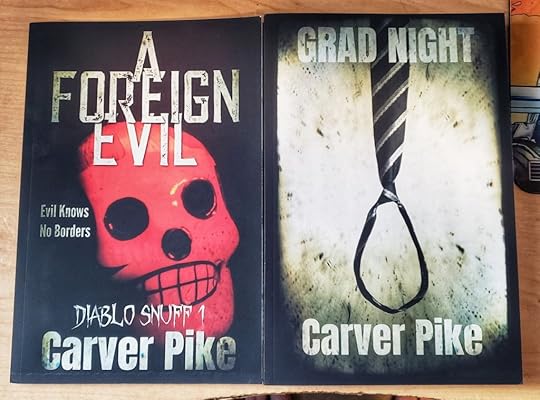
Carver Pike’s Grad Night is a novel I would love to see become a part of the curriculum in college programs for educators all over America.
This book takes us into the final days of the graduating class of DS High, as experienced through a couple of the educators. This is a nightmare vision of a high school. DS High is a place where the vile, underachieving children of mobsters can become class president. A school where students are filmed with cell phones while having sex in the back of an empty classroom. Essentially, if you imagine all the worst stories you’ve heard of juvenile delinquent behavior all across the country and condense it all into one senior class, you’ve got a good handle on the sort of children Charlie, Lauren, and the other teachers are working with.
It’s a difficult thing to remain an idealist under circumstances like these, one who believes in the better angels of human nature, but Charlie manages to do so throughout most of this novel. Having known a lot of high school teachers throughout my life (my mother being one), I have to say that there are plenty of people just like him in the hallways and classrooms across America, actively struggling to avoid becoming cynical and disengaged while being routinely buffeted by criticism and dismissal from students, parents, and administrators. This is not the place for idealists.
DS High is worse than the average high school, putting it mildly, and it’s only been getting more so since James Bender showed up. The worst and most cruel students of the graduating class flock to the silent and sinister boy, whose features are always hidden beneath a hood, and the most awful elements of their natures are amplified with his presence there. Things only seem to be going downhill as numerous students appear to be engrossed in a smutty, violent novel that seemingly appeared out of nowhere, a novel titled The Maddening.
When teachers and other staff are invited to join the soon-to-be-former students at a grad night party, their surprised pleasure rapidly becomes terror as the student body seeks to redress grievances in a way no one could have prepared for.
Avoiding spoilers with this one is a challenge, but it’s necessary as well. You have to experience it for yourself.
Antioch by Jessica Leonard
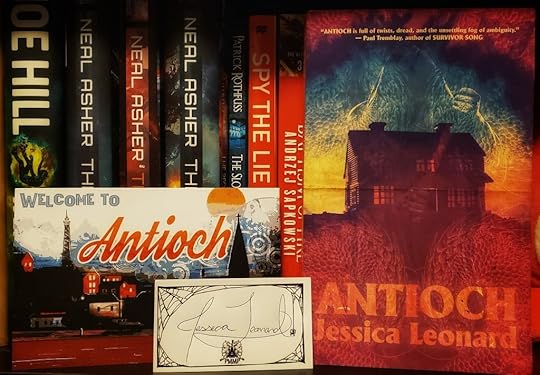
Jessica Leonard’s Antioch is a strange ride through a peculiar mystery tale revolving around a serial killer, conspiracy theories, and (as strange as it might seem) Amelia Earhart. All of this transpires in a town that feels both small and yet large enough that people can maintain that sort of invisibility you only find in larger cities. It feels like an unreal place, one that can only exist in our imaginations, not dissimilar to the fictional town of Twin Peaks. In fact, if I had to compare this novel to anything, I would have to say that it has a lot of that Twin Peaks feel to it…and that’s a good thing.
In the end, I’m pretty sure I have it figured out and–assuming I’m right–I had the story figured out in the ninth chapter, a little over midway through the book. The problem is, you can never be more than pretty sure that you have it figured out. There’s so much uncertainty and haziness to the tale, that you just can’t be 100% certain. This is achieved, in large part, by Leonard’s ability to develop and then focus on the least dependable and stable character in Bess. It’s not so much that we have an unreliable narrator to this story, just an ungodly unreliable prism through which the events are being filtered.
To refer to Antioch as a phantasmagoria is perhaps putting it mildly. You’ll just have to experience it for yourself, and it is quite the experience.
War Of Dictates by John Baltisberger
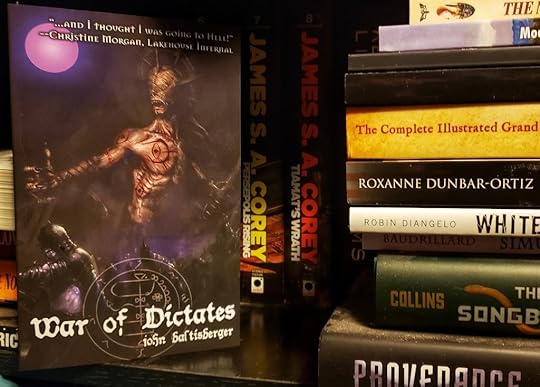
Beautifully sacrilegious and almost sinful in its flowing, narrative language, War of Dictates by John Baltisberger is something that can be thought of as almost a Kabalistic Hellraiser in poem form. I first thought of it as Paradise Lost for the S&M crowd, but that works only if Aleister Crowley had been halfway resurrected to pen the volume with still decaying hands. Instead of ruining the work by following it up with Paradise Regained (as Milton did), Baltisberger doubles down and digs deep into the darkness and deviance of a place worse than hell.
I wish I could recommend this book to everyone, but I know poetry (even the most cruel and depraved) has less wide appeal than it perhaps should. That being said, I still have to recommend it to anyone who might take the time to read it.
This is a Gospel written in blood and fire, fueled by rage and dreams.
Emergency Skin by N.K. Jemisin
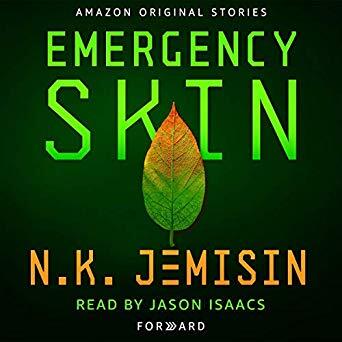
N.K. Jemisin’s Emergency Skin is a short story with a large message.
It’s a story about how much better off we might be if the world weren’t so full of greedy, self-entitled, self-important individuals. It’s a story with strong anti-racist, anti-sexist, and anti-imperialist sentiment showcased in a distant future tale. We have a 1,000 lightyear distant colony founded on the sort of fantasy meritocracy that might evolve from too many read-throughs of Atlas Shrugged, built on slave labor that is never acknowledged as slave labor, while the ruling class conveniently avoids any acknowledgment of the fact that they’re the real parasites. The “haves” fled an Earth approaching total ecological collapse, taking everyone and everything they valued in the process…assuming that the planet would fail without them there.
Little did they know the world could survive without them, perhaps better than it would have if they’d remained.
It’s difficult to avoid spoilers in the review of a short story, and I’ve danced around quite a few. Just read it or listen to it for yourself. It’s thought-provoking and engaging…and the audiobook is narrated by Jason Isaacs, who does a fantastic job (as I imagine you would expect).
Foreign Aid & International Relations
It seems to me that public comprehension of foreign financial aid is generally pretty low.
Less than 1% of the US Federal budget is typically distributed in the form of foreign aid to other nations, mostly developing nations, but also countries where there are US military bases in place (it’s more than you probably think).
What’s especially humorous to me is the fact that these same people I see complaining about foreign aid being sent to other nations are often the same ones talking about how defense is the most important budgetary concern. It’s like they’re entirely oblivious to the plain fact that federal spending in the form of foreign aid is one of the most important tools in the box where national defense is concerned…no, I misspoke, it’s not like that…it is that. They’re entirely oblivious when it comes to anything pertaining to diplomatic relations, foreign policy, and total federal spending. It’s perhaps not their fault that they’re stupid people, they suckle at a steady diet of bad/misleading information and memes in place of study.
The same people who I see shouting out about American exceptionalism and the superiority of capitalist social and economic structures are seemingly unaware of the way foreign aid is a propagandic method to encourage capitalist transitions in other countries.
I suspect these people also aren’t aware of the fact that more than 3/4 of the foreign aid doesn’t actually go to foreign governments or entities of those governments. It’s perhaps too much to expect that these same people recognize that part of that calculated budget dedication to foreign aid is in the form of military aid (troops and training).
It’s clear that altogether too few people take the time to read or study history in even the most rudimentary sense. This is precisely why I suggested that there needs to be a better focus on sociology and history in our educational system…and not just the, “America is Awesome,” variety certain politicians have been so fond of.



